HVAC Companies Narborough
Top HVAC Services in Narborough
Get 3 FREE Air Conditioning Services quotes for your project today! Compare profiles, reviews, accreditations, portfolio, etc... and choose the best deal.

MTH Plumbing and Heating Contracts Ltd
Unit 6St James Business Centre, Highfield Street, Unit 6St James Business CentreHighfield StreetCoalvilleLeicestershire, Coalville, LE67 3BN, GBMTH Plumbing and Heating Contracts Ltd have over 20 years of experience in helping customers in North West Leicestershire and surrounding areas. Mark Hosking and his team have a strong ethos of offering exceptional service to all their customers.Locally, we are recognised to be your go-to company for all your plumbing and heating requirements. We research our local market to ensure that our pricing remain competitive, but we will never substitute on quality. All our engineers are both Gas Safe registered, providing you with complete peace of mind.We are a Worcester Bosch accredited installer, with amazing customer reviews on the independent consumer platform Mybuilder.com.
- Services
- Why Us?
- Accreditations
- Our Team
- Testimonials
- Gallery
Get Quote
Kompressor Heat
Donington Le Heath, Coalville Leicestershire, 37 Manor Road, Coalville, LE67 2FU, GBWelcome to Kompressor Heat, your go-to company if you require renewable expert services. With over 20 years of experience, it was in 2015 that we changed our mission to help carbon reduction in the UK through the eco and retrofit sectors. With our vast wealth of technical, installation and compliance expertise, you can be assured that your house is in safe hands with us.
- Services
- Why Us?
- Accreditations
- Our Team
- Testimonials
- Gallery
Get Quote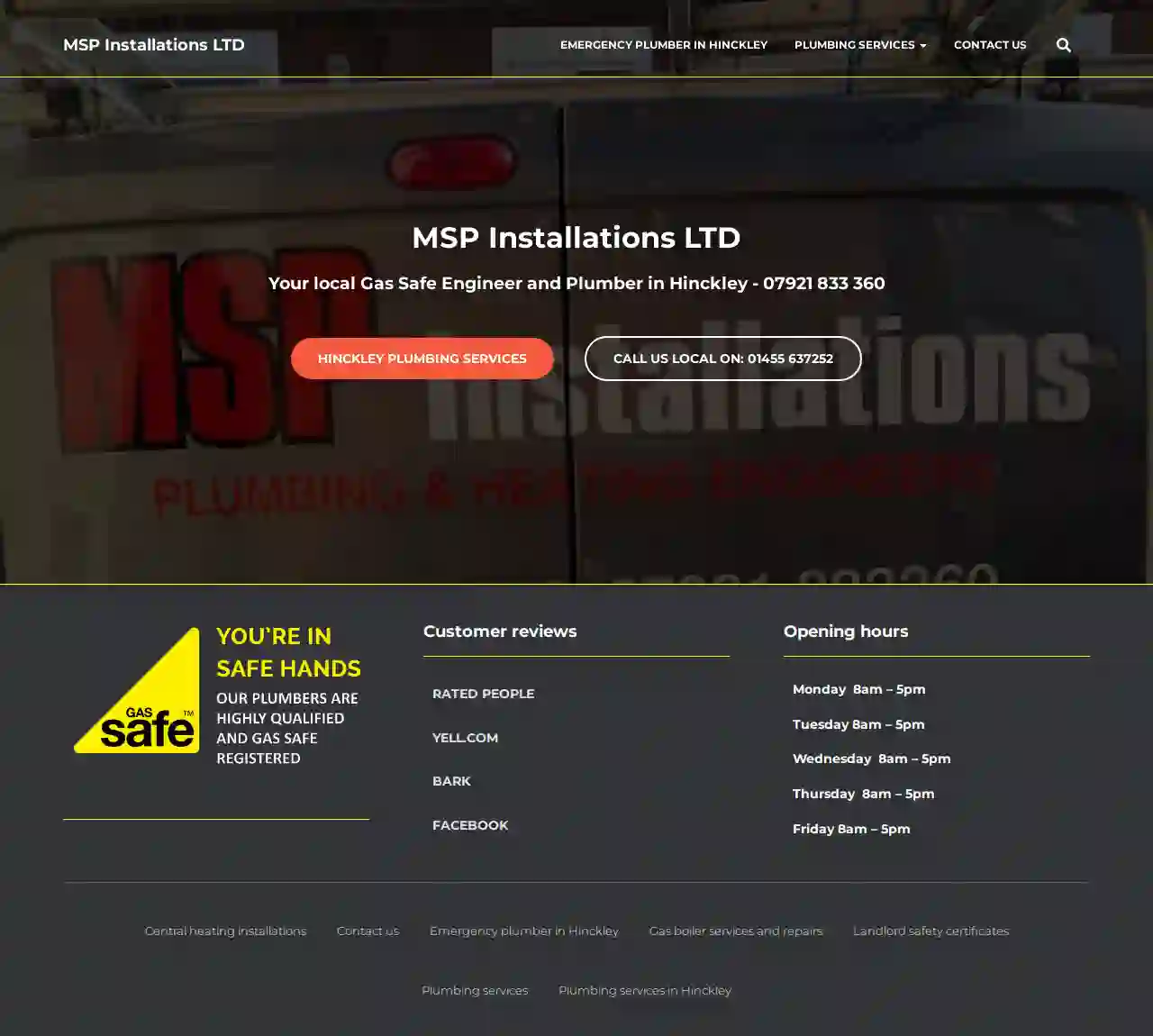
MSP Installations
4.512 reviewsHinckley, LE10, GBMSP Installations LTD is your local Gas Safe Engineer and Plumber in Hinckley. We offer a wide range of plumbing and gas services, including emergency plumbing, boiler services and repairs, landlord safety certificates, and central heating installations. Our team of experienced engineers is dedicated to providing high-quality workmanship and excellent customer service. We are committed to providing reliable and efficient solutions for all your plumbing and heating needs. Whether you require a simple repair or a complete system installation, we have the expertise and resources to deliver exceptional results. Contact us today for a free quote.
- Services
- Why Us?
- Gallery
Get Quote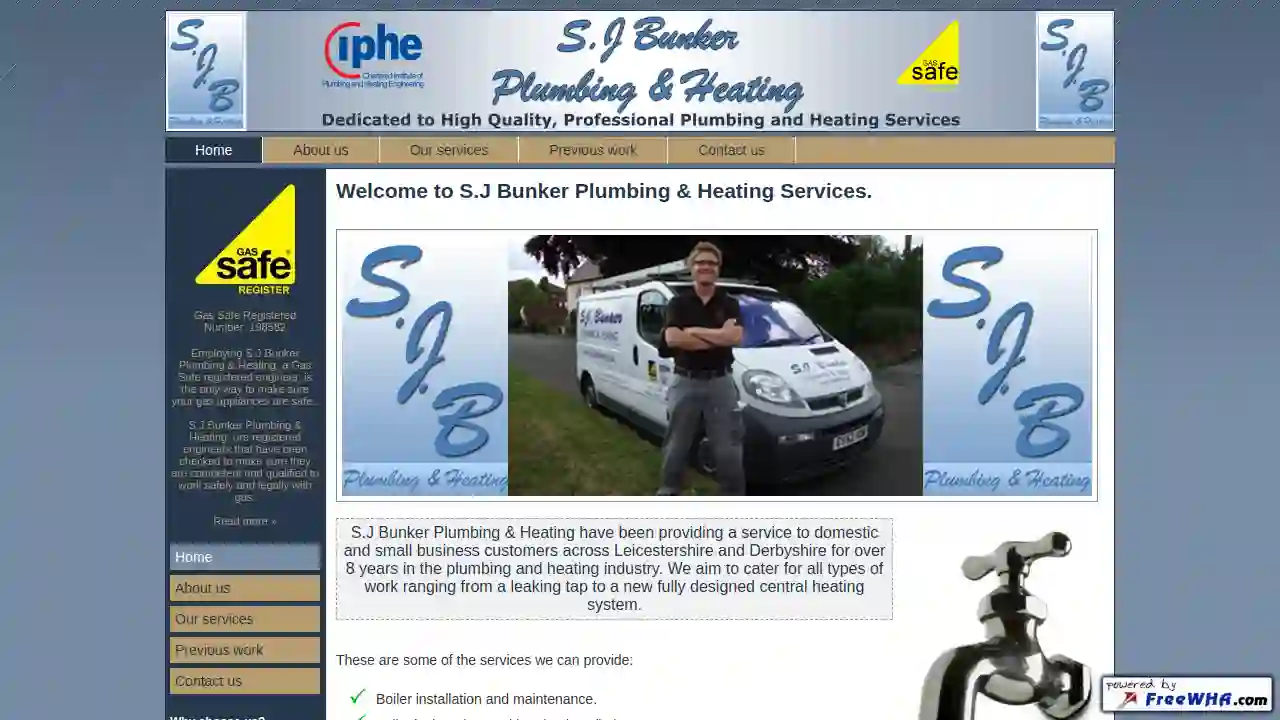
S.J.Bunker Plumbing & Heating
52 reviewsUnit 1, The Old Mill, Mill Road, Brighton, BN1 1AA, GBS.J. Bunker is a family-run business established in 1989. We are a specialist supplier of high-quality, bespoke timber products, serving both trade and retail customers. Our extensive range includes bespoke doors, windows, staircases, and other joinery items. We pride ourselves on our commitment to quality craftsmanship, using only the finest materials and employing skilled craftsmen with years of experience. Our team is dedicated to providing exceptional customer service, ensuring that every project is completed to the highest standards. At S.J. Bunker, we understand the importance of personalized service. We work closely with our clients to understand their individual needs and requirements, providing expert advice and guidance throughout the entire process. From initial design to final installation, we are committed to delivering a seamless and satisfying experience. Whether you are looking for a single bespoke item or a complete project, S.J. Bunker has the expertise and resources to meet your needs. Contact us today to discuss your requirements and let us bring your vision to life.
- Services
- Why Us?
Get Quote
D & E Heating, Air Conditioning & Refrigeration
4.720 reviews302 Power Avenue North, PO Box 138, Hinckley, 55037, GBD&E Heating and Air Conditioning provides quality workmanship and superior service with professional, dependable, and knowledgeable technicians for your complete heating, air conditioning, and indoor air quality products and systems. That's our promise to you. We value your home's comfort, so we only install the very best Heating, Ventilation, Air Conditioning (HVAC), and indoor air quality products available. This ensures the utmost energy savings, comfort, protection, and preservation of your home and its belongings. Whether you would like to request more information, set up a service call, or install a new HVAC system or comfort accessory, our finely trained staff is fully equipped to handle all of your HVAC equipment and indoor air comfort questions and needs.
- Services
- Why Us?
- Testimonials
- Gallery
Get Quote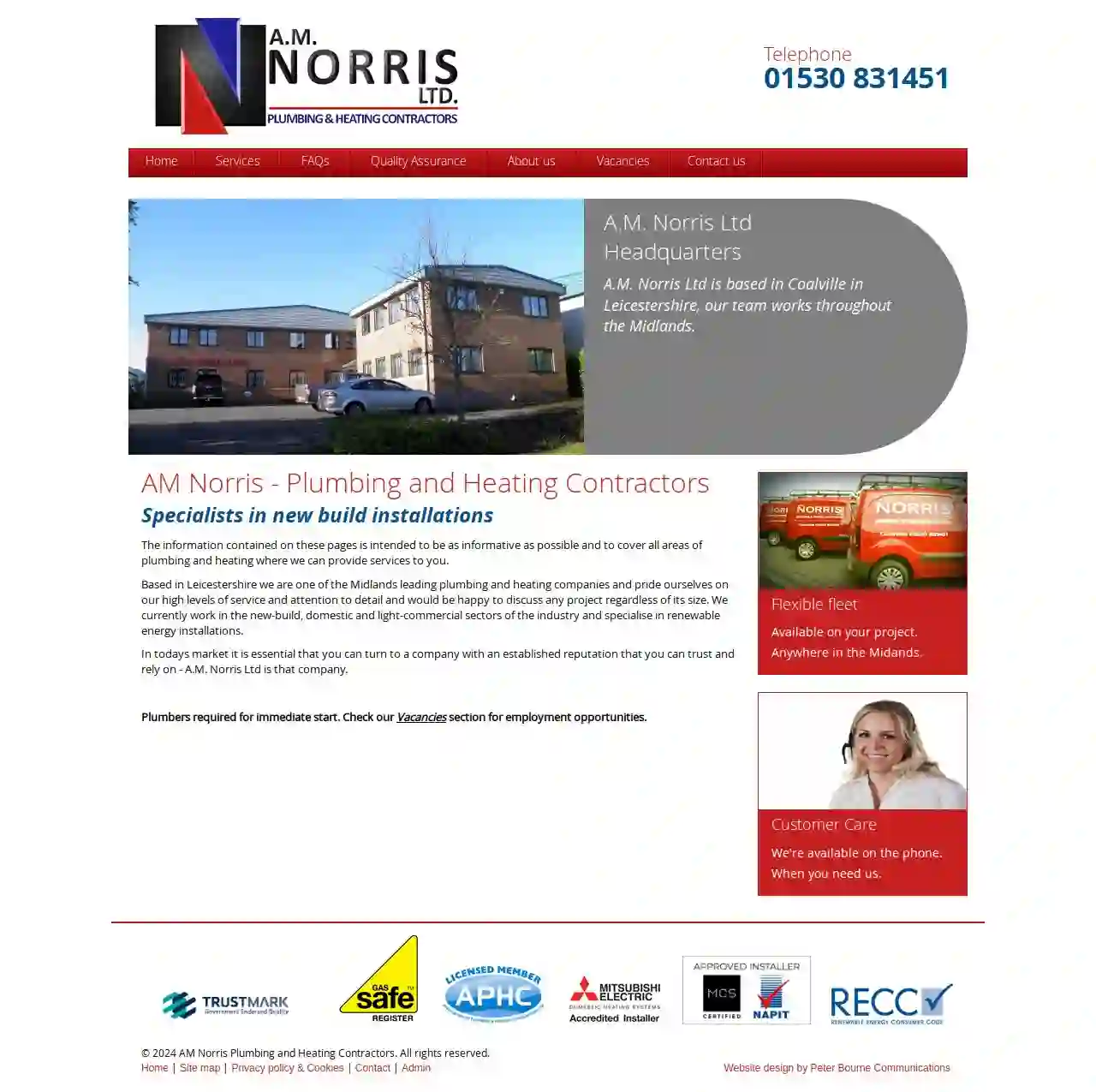
AM Norris Ltd
2.841 reviewsStephenson Industrial Estate, Brunel Way, Coalville, LE67 3HF, GBA.M. Norris Ltd is based in Coalville in Leicestershire, our team works throughout the Midlands. We have teams on site all over the Midlands - from 1 man to teams of 20 or more. We can meet the requirements of your new build development - ensuring plots are handed over on time and on budget. AM Norris - Plumbing and Heating ContractorsSpecialists in new build installationsThe information contained on these pages is intended to be as informative as possible and to cover all areas of plumbing and heating where we can provide services to you. Based in Leicestershire we are one of the Midlands leading plumbing and heating companies and pride ourselves on our high levels of service and attention to detail and would be happy to discuss any project regardless of its size. We currently work in the new-build, domestic and light-commercial sectors of the industry and specialise in renewable energy installations.In todays market it is essential that you can turn to a company with an established reputation that you can trust and rely on - A.M. Norris Ltd is that company.
- Services
- Why Us?
- Gallery
Get Quote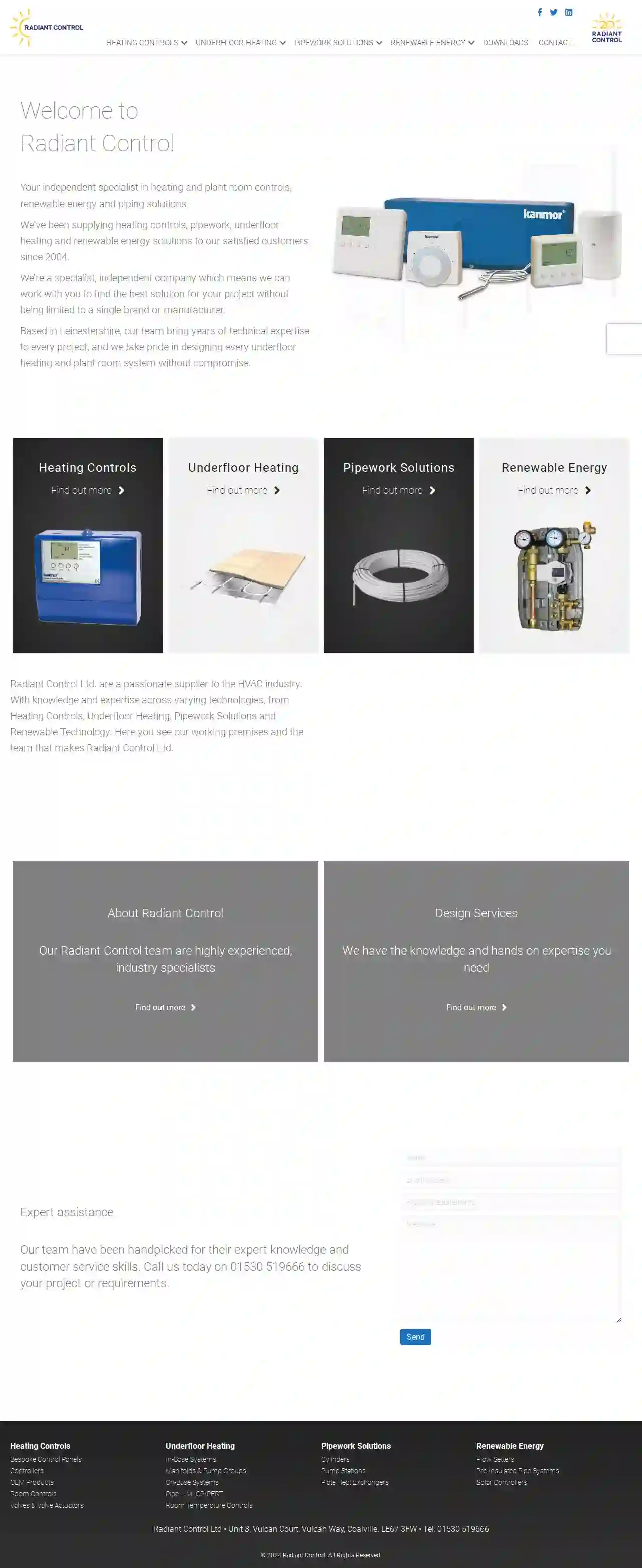
Radiant Control Ltd
516 reviewsVulcan Way, Unit 3, Vulcan Court, Coalville, LE67 3FW, GBRadiant Control is your independent specialist in heating and plant room controls, renewable energy and piping solutions. We’ve been supplying heating controls, pipework, underfloor heating and renewable energy solutions to our satisfied customers since 2004. We’re a specialist, independent company which means we can work with you to find the best solution for your project without being limited to a single brand or manufacturer. Based in Leicestershire, our team bring years of technical expertise to every project, and we take pride in designing every underfloor heating and plant room system without compromise.
- Services
- Why Us?
- Gallery
Get Quote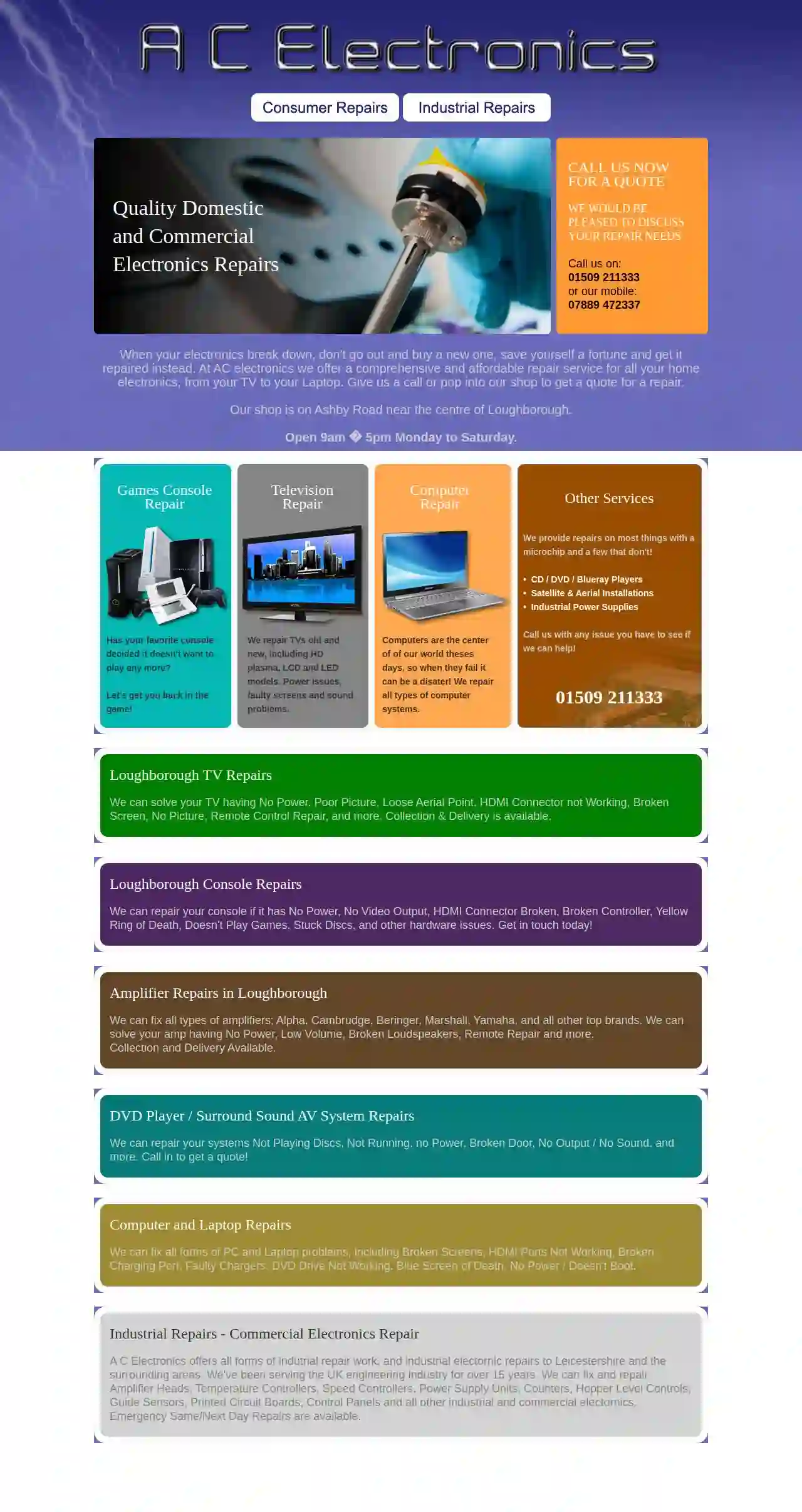
ac electronics
4.7160 reviewsAshby Road, Loughborough, GBAt AC Electronics, we offer a comprehensive and affordable repair service for all your home electronics, from your TV to your Laptop. We've been serving the UK engineering industry for over 15 years. We can fix and repair Amplifier Heads, Temperature Controllers, Speed Controllers, Power Supply Units, Counters, Hopper Level Controls, Guide Sensors, Printed Circuit Boards, Control Panels and all other industrial and commercial electronics. Our shop is located on Ashby Road near the centre of Loughborough and we are open 9am - 5pm Monday to Saturday.
- Services
- Why Us?
- Gallery
Get Quote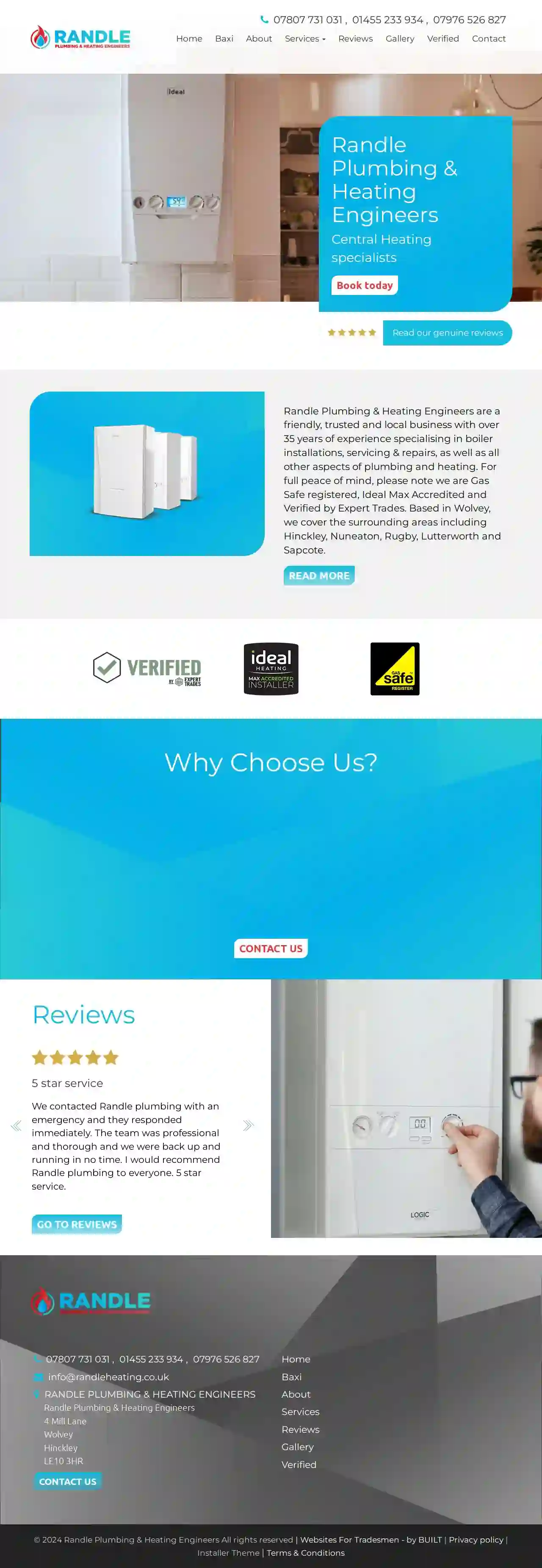
Randle Plumbing & Heating Engineers
569 reviewsWolvey, Hinckley, 4 Mill Lane, LE10 3HR, GBRandle Plumbing & Heating Engineers are a friendly, trusted and local business with over 35 years of experience specialising in boiler installations, servicing & repairs, as well as all other aspects of plumbing and heating. For full peace of mind, please note we are Gas Safe registered, Ideal Max Accredited and Verified by Expert Trades. Based in Wolvey, we cover the surrounding areas including Hinckley, Nuneaton, Rugby, Lutterworth and Sapcote.
- Services
- Why Us?
- Accreditations
- Our Team
- Testimonials
- Gallery
Get Quote
REMS Solutions Ltd
4.25 reviewsEast Leake, Unit 2 Station Road, LE12 6LQ, GBREMS Solutions is a trusted provider of Electrical, Mechanical, Refrigeration and Construction services throughout the UK. Our unrivalled customer service and pro-active communication means that we are the partner of choice for a number of leading retail brands in the UK. Partnering with us for your compliance, proactive and reactive maintenance gives you reliable support for all your facilities. REMS can work with you to provide a bespoke solution, tailored to your business needs, no matter the size. Looking for an expert team to renovate, install electrical, maintain a property inclusive of building works or to install Air Conditioning and heating facilities? REMS can assist with most facilities management projects – Why would you choose anyone else? With 20 years in facilities management and 40 years in electrical engineering, REMS has the expertise to deliver a wide range of services including air conditioning design and installation, electrical maintenance and breakdown cover, and more. Our team of experienced engineers have worked in retail, leisure, commercial and industrial sectors and specialise in providing bespoke low energy air conditioning installations including HVAC and VRV. We provide a ‘one call solution’ delivered by REMS or our partners, with a range of services including mechanical, electrical, air conditioning, refrigeration, building fabric, handyman planned visits, portable appliance testing, statutory inspections, thermal image reports, CAPEX works, 24/7 helpdesk, asset tagging & SFG20 alignment, planned & reactive breakdowns, managing 3rd party suppliers, and more.
- Services
- Why Us?
- Testimonials
- Gallery
Get Quote
Over 12,692+ HVAC Businesses on our directory
Our HVAC experts operate in Narborough and surroundings!
HVACCompaniesHub has curated and vetted Top HVAC Companies near Narborough. Find a top & reliable contractor today.
Frequently Asked Questions About HVAC Companies
- Warm Air: The most noticeable sign is that the AC is blowing warm or not cool air.
- Ice Buildup: Ice may form on the AC unit.
- Increased Energy Bills: Your system has to work harder to cool, leading to higher energy consumption.
- Hissing or Bubbling Sounds: These sounds can indicate a refrigerant leak.
- Change Air Filters: Change or clean your air filters every 1-3 months. Dirty air filters restrict airflow and decrease system efficiency.
- Clear Debris: Keep the area around your outdoor unit clear of debris, leaves, and snow.
- Check Thermostat Settings: Make sure your thermostat is set to the desired temperature and is functioning correctly.
How long does an HVAC system last?
What are the signs my air conditioner needs refrigerant?
What regular maintenance should I do on my HVAC system?
What is a ductless mini-split system?
How long does an HVAC system last?
What are the signs my air conditioner needs refrigerant?
- Warm Air: The most noticeable sign is that the AC is blowing warm or not cool air.
- Ice Buildup: Ice may form on the AC unit.
- Increased Energy Bills: Your system has to work harder to cool, leading to higher energy consumption.
- Hissing or Bubbling Sounds: These sounds can indicate a refrigerant leak.
What regular maintenance should I do on my HVAC system?
- Change Air Filters: Change or clean your air filters every 1-3 months. Dirty air filters restrict airflow and decrease system efficiency.
- Clear Debris: Keep the area around your outdoor unit clear of debris, leaves, and snow.
- Check Thermostat Settings: Make sure your thermostat is set to the desired temperature and is functioning correctly.